Jamaica, May 2006: Day 3, May 20, 2006, Kingston (Four Dumplings and a Funeral)
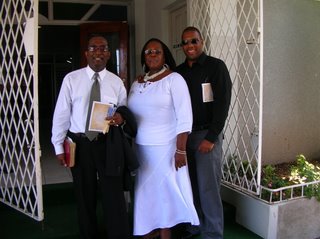
The next morning was a rush to get out the door to get to the funeral on time, but that didn’t stop us from enjoying the complimentary full Jamaican breakfast offered in the hotel’s patio dining room.
It was some of the best ackee, saltfish, dumplings/johnny cakes and coffee I’ve ever had.
Surprisingly, I only had one helping as I didn’t want to fall asleep during the service.
Dressed for the funeral, we met up with two of my mother’s cousins who were also staying at the hotel.
As black is the traditional color for funerals in the States, I observed that
Jamaica funeral colors were black, white, purple or a variant there of.
Foregoing a suit because of the 90 degree weather, I wore a black shirt with gray slacks, but my mother, the ever non-traditionalist, wore an all white dress.
Ever since my father passed, she’s never worn black to a funeral.
She thinks of funerals now as a celebration of life, not as mourning of their death.
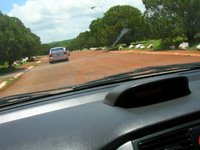 The funeral was held at a small church on the outskirts of Kingston. I expected crying from most of the attendees, but I saw more laughter than anything else. Cousins greeted cousins who they haven’t seen a while. Brothers and sisters caught up with one another. I met second cousins who swore they met me once before or mistook me for my older brother. I was smiling through most of the funeral until my cousin, Candice, who was also the granddaughter to the deceased, gripped my arm and started crying on my shoulder. Grief has a weird way of sneaking up on
The funeral was held at a small church on the outskirts of Kingston. I expected crying from most of the attendees, but I saw more laughter than anything else. Cousins greeted cousins who they haven’t seen a while. Brothers and sisters caught up with one another. I met second cousins who swore they met me once before or mistook me for my older brother. I was smiling through most of the funeral until my cousin, Candice, who was also the granddaughter to the deceased, gripped my arm and started crying on my shoulder. Grief has a weird way of sneaking up on  people. As people spoke at the podium the mood swayed from somber to reflective, jovial to congratulatory towards Aunt Myrtle’s children. One can run the full gambit of emotions at a funeral no matter your relation or feelings towards the deceased. Overall, my observation of a Jamaican funeral was that even in death a person still commands the respect they earned in life. Aunt Myrtle was respected by her family, friends, church and the community at large. She raised three adopted boys, fostered most of my mother’s cousins and was a voice of reason amongst her
people. As people spoke at the podium the mood swayed from somber to reflective, jovial to congratulatory towards Aunt Myrtle’s children. One can run the full gambit of emotions at a funeral no matter your relation or feelings towards the deceased. Overall, my observation of a Jamaican funeral was that even in death a person still commands the respect they earned in life. Aunt Myrtle was respected by her family, friends, church and the community at large. She raised three adopted boys, fostered most of my mother’s cousins and was a voice of reason amongst her 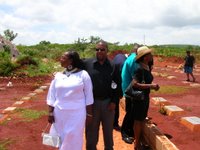 brothers and sisters, including my grandfather. Her daughter, Joyce, was the last to speak. Some expected her to begin crying uncontrollably, but her resolve on the podium was outstanding. She was the same one who was talking with my mother on the flight down about Aunt Myrtle’s legacy. She reminded the congregation of how that legacy should be remembered – respected, honored and loved.
brothers and sisters, including my grandfather. Her daughter, Joyce, was the last to speak. Some expected her to begin crying uncontrollably, but her resolve on the podium was outstanding. She was the same one who was talking with my mother on the flight down about Aunt Myrtle’s legacy. She reminded the congregation of how that legacy should be remembered – respected, honored and loved.
The funeral was followed by more laughter and greetings, and a long drive to a large cemetery outside Kingston in Portmore, called Dovecott. The cemetery is one of Kingston’s most prominent burial places, but doesn’t have the look of prominence. There are no elaborate mausoleums or headstones. There are just rows of orderly plaques. It resembled a military cemetery with the exception of the incredibly red dirt. We couldn’t keep up with the motorcade because of traffic and a few pit stops so we arrived as the coffin was going into the ground. I also noticed that there wasn’t a tent and chairs set up for the family to observe the casket lowering. Mourners were grouped together in loose circle around the gravesite with no escape from the shade. Instead of standing silent observing the casket lowering, everyone sang hymnals. We swayed to the communal beat and sang in our own keys. Also, we stayed to watch the cemetery workers fill in the gravesite with concrete and dirt. I’ve never heard of people staying to watch this part of a funeral. It was a little discomforting. It seemed that even though they were celebrating, people were holding on to their last memories of Aunt Myrtle. We didn’t leave until the workers were finished. I walked away with my mother and I talked to her about my observations. She told me staying to watch the full burial brings closure for a Jamaican family. As Americans, we walk away as soon as the casket starts to lower into the ground still carrying the hurt effectively robbing ourselves of the opportunity to “see” closure.
I was still uncomfortable watching the workers fill in the grave, but the vendor selling ice cream cakes on the cemetery road lifted my spirits even though I thought it was a blatant disrespect to the dead to do business around graves. I chalked it up to good business sense. When it’s 90+ degrees and people are mourning in dark and heavy clothes they need something to cool them off. It’s morbid, but I was happy to give him $400JA for two ice cream cakes and a juice.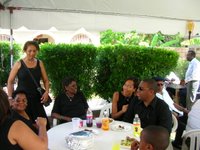
After departing from Dovecott we went to the post-funeral gathering at Aunt Myrtle’s old home. People were obviously tired so we cut our carousing short in order to eat and then go to our respective places to rest. Before leaving I made arrangements to meet up with Candice to go clubbing later that night, but those plans changed later on.
Back at the Terra Nova I caught some rest in order to prepare myself for whatever fun I would have that night. I took a good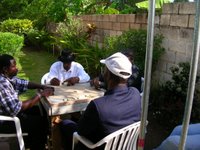 two-hour nap only to wake up to a heavily snoring mother. I tried to go the pool to burn off some energy, but the pool crew hadn’t cleaned the debris from the previous day’s storm. Frustrated, I went back to my room and forced myself back to sleep for another two hours only to wake up to the phone ringing and my mother still snoring. One of my mother’s cousins staying at the Terra Nova wanted to know what was planned for that evening. I didn’t know what the “older” crowd was doing, but I was looking forward to partying with attractive young Jamaican women or so
two-hour nap only to wake up to a heavily snoring mother. I tried to go the pool to burn off some energy, but the pool crew hadn’t cleaned the debris from the previous day’s storm. Frustrated, I went back to my room and forced myself back to sleep for another two hours only to wake up to the phone ringing and my mother still snoring. One of my mother’s cousins staying at the Terra Nova wanted to know what was planned for that evening. I didn’t know what the “older” crowd was doing, but I was looking forward to partying with attractive young Jamaican women or so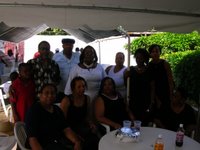 I thought. Ironically, my mother’s cousin didn’t find humor in that statement.
I thought. Ironically, my mother’s cousin didn’t find humor in that statement.
I called and left a message for Candice to call me when she was ready. It was already getting late, so I freshened up to prepare for the evening. My mother was still snoring. I called my mother’s other cousin staying at the Terra Nova, the Dr. (professor), and asked if she wanted to get a drink at the hotel bar. I met Dr. Rose for the first time at my college graduation in 2002 and found her very interesting. She loved information, and was extremely opinionated. Looking dapper, I strolled to the bar and ordered my favorite drink, Bailey’s on the rocks. Dr. Rose met up with me and we enjoyed a long conversation about everything from politics to family. Our bartender added his comments whenever he felt necessary. I was having a genuinely good time, but it got better when Dr. Rose suggest we grab some dinner at the hotel’s extravagant restaurant. She raved about the seafood Caesar salad and the lobster salad. I soon realized that her rantings were true. We ordered at the bar and were promptly seated in the main dining room. The dining room of the Terra Nova befits the building’s heritage as an island mansion. Ornate high-back chairs encircled mahogany tables with crisp white lines, elaborate china plates and exquisite crystal glasses. I felt a touch of old Southern American charm, but remembered that this island had a charm all of its own.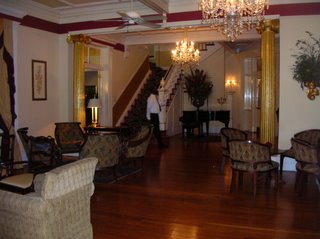
I took Dr. Rose’s advice and ordered the seafood Caesar salad and she had the lobster salad. We continued the conversation as the service began with spring water, another round of drinks, toasted Italian bread and finally our salads. The salads were appetizers on the menu, but the portion was definitely entrée sized. After a squeeze of lemon and a drizzle of the Caesar dressing I tasted this talked up salad and soon found myself in full agreement with Dr. Rose. The seafood was probably caught that morning because it was the freshest I’ve tasted in a while. Dr. Rose and I were all smiles as we talked, ate seafood salads and drank to our hearts’ content. We followed the salads with bread pudding for dessert. I’ve grown up with my mother’s style of bread pudding – a firm cake-like pudding filled with raisins, cinnamon, nutmeg and a hint of rum. This bread pudding put hers to shame. When it arrived the pudding was cylinder shaped resting in a pool of heated condensed milk and rum. It was spongier than my mother’s, but it was warm and inviting. I didn’t resume talking until I had finished it. I sat back and breathed a relaxing sigh. I had just enjoyed a fabulous meal, great conversation and in the atmosphere of aristocratic Jamaica. In my book, my night was officially concluded, but when you’re traveling with three Jamaican women, it’s not your book. My mother and her cousin soon found us in the restaurant. They were ready to get there evening started while I just wanted to have another drink and go to bed. Also, Candice had failed to return my call about clubbing this night, so I decided to tag along with the ladies to an oldies outdoor concert at Countryside Club (19-21 Eastwood Park Road, Kingston).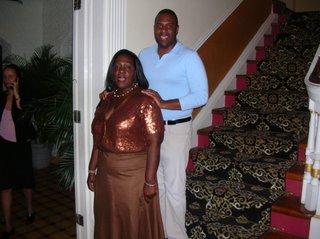
Inner city driving in Kingston is an adventure, but at night it turns into a scavenger hunt. Some streets don’t have street signs, plus your daytime landmarks look completely different at night. After circling one block about four times we finally found Countryside Club. After paying a $500JA entry fee, we stepped into a nicely crafted outdoor venue with a stage in the foreground and make believe “shacks” lining the outside selling snacks and drinks. The crowd was having a grand time swaying to oldies artist that I’ve never heard of, but there music sounded familiar. I soon found myself singing along as the sub-consciously memorized songs of my father’s deejay days surfaced in my memory. Even though the crowd was significantly older, I still had a good time with the exception of my clothes. Unfortunately, I was dressed for an indoor club and felt a little uptight as everyone else was in comfort clothes. It was also a humid night, so wearing a long-sleeve polo shirt probably wasn’t the best idea. After an hour or so of revelry the ladies were tired. I was more than happy to get to bed. Although the funeral had made this day solemn we ended it on an upbeat note celebrating life, family and fun.
Jamaica, May 2006: Day 2, May 19, 2006, Ocho Rios, Spanish Town, Kingston (Mountain Roads, Potholes, Grandpa and Nine Night)
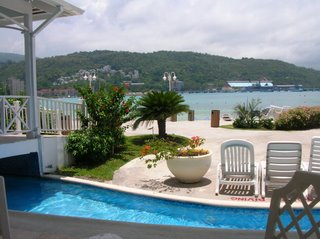
The next day was full of excitement as we prepared for the true test of our driving abilities – the dreaded two-hour or more drive from Ocho Rios to
Kingston.
I declared that we would leave no later than
1 p.m., but after realizing that a beautiful Jamaican morning on a beach with free food and drinks was upon me, I moved our departure closer to
2 p.m. We ate another surprisingly Jamaican meal with ackee, saltfish and cornmeal porridge combined with french toast, eggs and fresh fruit.
The view from our table was fabulous with a view of the beach, harbor and mountains.
I still didn’t like the fact that we were in a gated resort, but with a good view, food, a mimosa and a cup of
Jamaican Blue Mountain coffee, I no longer wanted to complain.


We checked out on-time and after taking care of some business in town we were on the mountainous roads of the A3 heading to Kingston. I always knew my mother disliked my driving, but after a while I started to dislike her as a passenger. Throughout the drive she gripped the handrail and shouted at me as every truck, person, rock, pothole and goat wandered too close to our vehicle. I reminded her about our full coverage on the car, our mobile phone and the fact that I had two options, hit the truck or the pothole. Which one would you choose? We reached Faith’s Penn, a popular roadside collection of shacks selling jerk chicken, roast fish and an assortment of other foods – the Jamaican version of a rest stop. This stop also marked the halfway point of our journey over the mountains. At first, I didn’t want to stop because of timing, but how could I ignore an experience that I had grown to cherish over the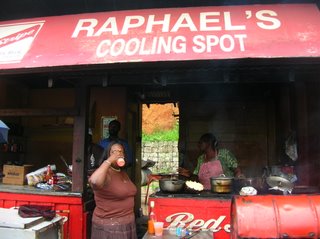 years? My mother haggled her way into only paying $500JA (around $8US) for a ¼ lb. of jerk chicken, four festival (sweet, friend dumplings), a whole fried fish, yam, sweet potato, a Ting (grapefruit soda) and a whole liter of homemade carrot ginger juice – a steal. The guy that got this sale did a good job at attracting us to his spot. When we entered the rest stop, we were mobbed by aggressive proprietors, but this guy came up to us politely and asked what we wanted instead of forcing us to by what he had. He and his family, who were cooking in the shack, were accommodating and warm. I would’ve been scared as a child, but now I was laughing with locals, understanding the language and experiencing a taste of home.
years? My mother haggled her way into only paying $500JA (around $8US) for a ¼ lb. of jerk chicken, four festival (sweet, friend dumplings), a whole fried fish, yam, sweet potato, a Ting (grapefruit soda) and a whole liter of homemade carrot ginger juice – a steal. The guy that got this sale did a good job at attracting us to his spot. When we entered the rest stop, we were mobbed by aggressive proprietors, but this guy came up to us politely and asked what we wanted instead of forcing us to by what he had. He and his family, who were cooking in the shack, were accommodating and warm. I would’ve been scared as a child, but now I was laughing with locals, understanding the language and experiencing a taste of home.
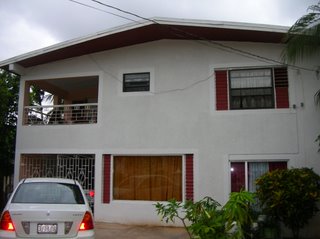 After another hour of mountain roads we arrived at our second pit stop, my maternal grandfather’s house in Spanish Town, a suburb 20 miles west of Kingston. Spanish Town was Jamaica’s administrative capital for more than 300 years until 1872 when Kingston, the merchant center, was named the new capital. The town has seen a sharp decline since then and isn’t for the faint at heart, but it still holds its charm in the people and historic architecture. My grandfather’s house is on the outskirts of the city along the road coming from Ocho Rios. Affectionately called “Grandpa Christy,” my grandfather, Christopher Rose, is a “young” grandfather; he’s only in his early 70s. I spent many summers there as a child being bored by the limited television channels, but entertained playing with local kids, chasing chickens and getting into mischief with my little brother in tow. The house held many great memories of family vacations and playing in the rain with my father. Nothing had changed in the house since my last visit before my father died in 2000. My mother enthusiastically greeted her father as we sat out on his veranda enjoying the evening breeze. At night, Jamaica takes on a beautiful natural symphony as tree frogs, croaking lizards and crickets play a melody that can rock the grumpiest baby to sleep. I was out within 30 minutes. The power had gone out during my nap so I awoke to a candlelight conversation between my mother, grandfather and his wife. I thought it funny that without the conveniences that I take for granted, such as electricity, life can still carry on without a problem here.
After another hour of mountain roads we arrived at our second pit stop, my maternal grandfather’s house in Spanish Town, a suburb 20 miles west of Kingston. Spanish Town was Jamaica’s administrative capital for more than 300 years until 1872 when Kingston, the merchant center, was named the new capital. The town has seen a sharp decline since then and isn’t for the faint at heart, but it still holds its charm in the people and historic architecture. My grandfather’s house is on the outskirts of the city along the road coming from Ocho Rios. Affectionately called “Grandpa Christy,” my grandfather, Christopher Rose, is a “young” grandfather; he’s only in his early 70s. I spent many summers there as a child being bored by the limited television channels, but entertained playing with local kids, chasing chickens and getting into mischief with my little brother in tow. The house held many great memories of family vacations and playing in the rain with my father. Nothing had changed in the house since my last visit before my father died in 2000. My mother enthusiastically greeted her father as we sat out on his veranda enjoying the evening breeze. At night, Jamaica takes on a beautiful natural symphony as tree frogs, croaking lizards and crickets play a melody that can rock the grumpiest baby to sleep. I was out within 30 minutes. The power had gone out during my nap so I awoke to a candlelight conversation between my mother, grandfather and his wife. I thought it funny that without the conveniences that I take for granted, such as electricity, life can still carry on without a problem here.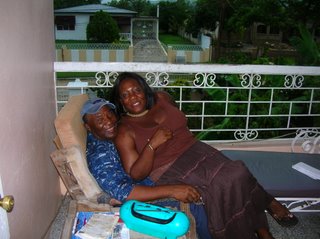
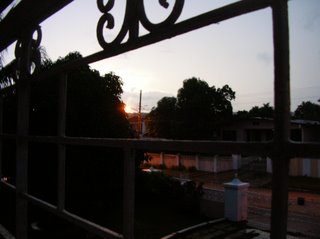
After the lights came back on my mother and I decided to bid farewell to my grandfather in order to get to our hotel in Kingston before it got too late. Back on the road we faced a new obstacle, driving at night in city traffic on the opposite side of the road. There wasn’t much of a difference from our previous experiences, but we had to rely on headlights in order to see the lines in the road because of the lack of street lights on the outskirts of Kingston. Once we reached Kingston things were dramatically different. The decision to move the island’s capital to Kingston was for good reason. Out of a population of 2.7 million, more than a 25% or over 800,000 people live in Kingston. It’s a city full of light, music and mayhem. Drivers sped down Nelson Mandela Highway on their way to the city. Lights twinkled for 180 degrees, from the mountains with their palatial homes, to bustling downtown Kingston and gleaming New Kingston – the country’s financial center. I remembered traveling these roads with my father while he gathered supplies to run the now defunct family grocery store in downtown Kingston. The roads still looked familiar, but there were definite signs of progress. They were now wider. There were more traffic lights. There were automated changing billboards lining the roads. Progress had taken this once boring capital of my uncultured childhood and turned it into thriving metropolis just waiting for me to explore.
A few turns up familiar roads, we entered into another set of gates that contained our hotel, the Terra Nova (17 Waterloo Road, Kingston 10). The Terra Nova considers itself the pride of New Kingston and it has every right to say so. We drove up to what was once an old mansion that was now converted into a luxury hotel catering to New Kingston’s business elite. Again, my mother haggled her way into a deeply discounted rate for a double room for only $150/night including a full breakfast every morning. I barely had time to explore the hotel before we were back out the door heading to the “Nine Night” festivities for Aunt Myrtle. A Jamaican tradition, Nine Night is a party or gathering of the deceased’s family and friends nine days after the death or the night before the funeral in order to provide comfort to one another and to wish the departed Godspeed to heaven. It’s a tradition to prevent the rise of a “duppy” or ghost that might harm the living relatives and friends. It usually consists of heavy drinking, eating and laughing. It was my type of party.
The crowd was significantly older, but the younger “cousins” had all gathered together to discuss the night’s outing to the nightclubs in Kingston and around the city. I conversed with them for a while, but found myself observing other conversations. Death has a funny way of bringing out truth in a family. My mother’s side was no exception as tears, heated arguments and familial revelations flowed throughout the evening. I was amazed that I didn’t see any of this during my father’s funeral, but during that time I was too distraught to even know what day it was.
A few hours later, the crowd had started to wind down. I decided to skip any evening plans with the cousins in order to get some sleep to prepare for the 9 a.m. funeral the next day. My mother and I must’ve said our goodbyes for 30 minutes before we finally filed into our car and heading back to the Terra Nova to sleep.
Jamaica, May 2006: Day 1, May 18, 2006, Montego Bay, Ocho Rios (Jet Lag, Left-Side Driving, Coming Home)
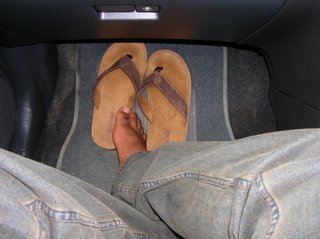
I haven’t been back to
Jamaica in almost three years.
I know those who’ve never been to
Jamaica are rolling their eyes right now at my distress, but this tropical paradise isn’t just a vacation, it’s my homecoming for another’s homegoing.
My mother had asked me to accompany her to
Jamaica for the funeral of her Aunt Myrtle.
I remembered her from my childhood and was saddened by the loss, but happy about the opportunity to see
Jamaica again.
Halfway through the two and a half hour flight from
Atlanta, I was dead asleep seeing that I had been up since
2:30 a.m. that day.
It’s a family tradition to pack at the last minute on the day of any trip.
I awoke to the lyrical, but annunciated voice of the flight attendant announcing our final descent into
Montego Bay, Jamaica.
The plane banked sharply to the left to line up with the airport’s lone runway, that’s when I caught a glimpse of Jamaican north coast with the
Blue Mountains in the foreground.
I must’ve seen this sight dozens of times from my trips here as a child, but this time felt different.
I was here to experience
Jamaica as a man, not as a child.
I wanted to see the good and bad, I would get more than I asked for.
After a bumpy landing I expected to go through a long wait at the arrivals hall without air conditioning. I was sadly mistaken when we disembarked at one of Donald Sangster Montego Bay International Airport’s new jetways and went quickly through immigration with the help of computers and document scanners. The inconvenient charm of this island airport had been replaced with progressive sterilization. It was probably more palatable to non-Jamaican visitors, but I liked things the way they were. I guessed progress had to catch up to all places eventually.
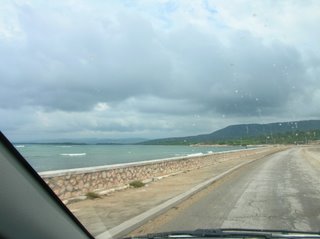 After immigration and customs, my mother and I picked up our rental car, a swift Suzuki Lianna, and ventured out to a five day left-side of the road excursion to mourn and have fun doing it – typical Jamaican style. The first day was spent sloshing through intermittent, but heavy rainstorms on a newly started, but halfway finished highway along the north coast of the island. Our destination was the resort town of Ocho Rios, meaning “eight rivers” in Spanish. More commonly called “Ochi,” the town is a leisurely two-hour drive east from Montego Bay and north from Kingston, the capital. We arrived victorious, giddy that we had just driven through rain, mud and other aggressive Jamaican drivers all while on the opposite side of the road. I felt my dad giving me a “thumbs up” from heaven. Usually he did all the driving.
After immigration and customs, my mother and I picked up our rental car, a swift Suzuki Lianna, and ventured out to a five day left-side of the road excursion to mourn and have fun doing it – typical Jamaican style. The first day was spent sloshing through intermittent, but heavy rainstorms on a newly started, but halfway finished highway along the north coast of the island. Our destination was the resort town of Ocho Rios, meaning “eight rivers” in Spanish. More commonly called “Ochi,” the town is a leisurely two-hour drive east from Montego Bay and north from Kingston, the capital. We arrived victorious, giddy that we had just driven through rain, mud and other aggressive Jamaican drivers all while on the opposite side of the road. I felt my dad giving me a “thumbs up” from heaven. Usually he did all the driving. 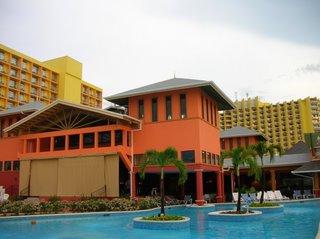
We checked in to the Sunset Jamaica Grande Resort (Main Street), a behemoth all-inclusive resort sitting on Turtle Beach. Staying in a place like Jamaica Grande went against my manifesto of experiencing a destination instead of just visiting it. Even though the staff is entirely Jamaican, guests are limited from experiencing the island’s true culture. I made the exception for my mother’s desire for affordability, comfort and peace of mind. I made more concessions on the basis that all-inclusive resorts mean free food and drinks, including alcohol. I was at the bar within five minutes of our arrival.
In my honest opinion, Sunset Jamaica Grande is comparable to a cruise ship, but on land. Everything’s provided so you don’t have to worry, but you can get bored easily if you run out of things to do. Luckily we were only staying one night, so we had plenty of fun. The rooms are respectable for the price of $200/night. I was just glad for a comfortable bed and the alcohol helped too. I tried to lay down for an hour nap especially seeing that the latest rainstorm had turned the colorful scenery into a dreary muck. I didn’t succeed in my napping endeavor, but I was glad to be awake seeing that the rainstorm had dissipated leaving behind a glorious sunset.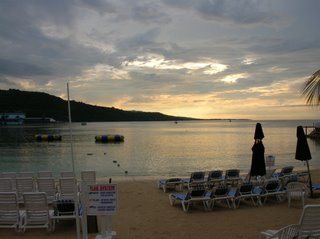
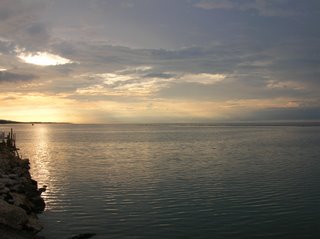
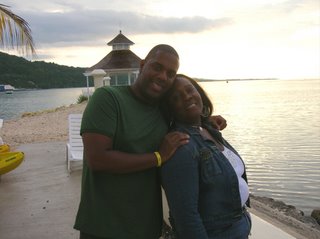
Slightly refreshed, we changed for dinner at the Grande Buffett, the resort’s main dining room. Dinner was surprisingly authentic. The pepper steak, callaloo, yams and bammy were offset with Westernized rice, barbecue chicken and various other items. I was content at the variety, plus I never pass up a free meal. Full from two helpings of dinner and dessert we wandered around the grounds catching a floor show in the entertainment pavilion and finally ending up in the resort’s nightclub, Jamaica Me Crazy. I only lasted an hour after dinner. The food, drinks and need for rest had caught up with me and soon found myself groggily stumbling towards my bed.
 The next morning was a rush to get out the door to get to the funeral on time, but that didn’t stop us from enjoying the complimentary full Jamaican breakfast offered in the hotel’s patio dining room. It was some of the best ackee, saltfish, dumplings/johnny cakes and coffee I’ve ever had. Surprisingly, I only had one helping as I didn’t want to fall asleep during the service. Dressed for the funeral, we met up with two of my mother’s cousins who were also staying at the hotel. As black is the traditional color for funerals in the States, I observed that
The next morning was a rush to get out the door to get to the funeral on time, but that didn’t stop us from enjoying the complimentary full Jamaican breakfast offered in the hotel’s patio dining room. It was some of the best ackee, saltfish, dumplings/johnny cakes and coffee I’ve ever had. Surprisingly, I only had one helping as I didn’t want to fall asleep during the service. Dressed for the funeral, we met up with two of my mother’s cousins who were also staying at the hotel. As black is the traditional color for funerals in the States, I observed that  The funeral was held at a small church on the outskirts of
The funeral was held at a small church on the outskirts of  people. As people spoke at the podium the mood swayed from somber to reflective, jovial to congratulatory towards Aunt Myrtle’s children. One can run the full gambit of emotions at a funeral no matter your relation or feelings towards the deceased. Overall, my observation of a Jamaican funeral was that even in death a person still commands the respect they earned in life. Aunt Myrtle was respected by her family, friends, church and the community at large. She raised three adopted boys, fostered most of my mother’s cousins and was a voice of reason amongst her
people. As people spoke at the podium the mood swayed from somber to reflective, jovial to congratulatory towards Aunt Myrtle’s children. One can run the full gambit of emotions at a funeral no matter your relation or feelings towards the deceased. Overall, my observation of a Jamaican funeral was that even in death a person still commands the respect they earned in life. Aunt Myrtle was respected by her family, friends, church and the community at large. She raised three adopted boys, fostered most of my mother’s cousins and was a voice of reason amongst her  brothers and sisters, including my grandfather. Her daughter, Joyce, was the last to speak. Some expected her to begin crying uncontrollably, but her resolve on the podium was outstanding. She was the same one who was talking with my mother on the flight down about Aunt Myrtle’s legacy. She reminded the congregation of how that legacy should be remembered – respected, honored and loved.
brothers and sisters, including my grandfather. Her daughter, Joyce, was the last to speak. Some expected her to begin crying uncontrollably, but her resolve on the podium was outstanding. She was the same one who was talking with my mother on the flight down about Aunt Myrtle’s legacy. She reminded the congregation of how that legacy should be remembered – respected, honored and loved.
 two-hour nap only to wake up to a heavily snoring mother. I tried to go the pool to burn off some energy, but the pool crew hadn’t cleaned the debris from the previous day’s storm. Frustrated, I went back to my room and forced myself back to sleep for another two hours only to wake up to the phone ringing and my mother still snoring. One of my mother’s cousins staying at the Terra Nova wanted to know what was planned for that evening. I didn’t know what the “older” crowd was doing, but I was looking forward to partying with attractive young Jamaican women or so
two-hour nap only to wake up to a heavily snoring mother. I tried to go the pool to burn off some energy, but the pool crew hadn’t cleaned the debris from the previous day’s storm. Frustrated, I went back to my room and forced myself back to sleep for another two hours only to wake up to the phone ringing and my mother still snoring. One of my mother’s cousins staying at the Terra Nova wanted to know what was planned for that evening. I didn’t know what the “older” crowd was doing, but I was looking forward to partying with attractive young Jamaican women or so I thought. Ironically, my mother’s cousin didn’t find humor in that statement.
I thought. Ironically, my mother’s cousin didn’t find humor in that statement.















